American Arcadia review - a charming but simplistic spin on the Truman Show
Call of the TV.
I worried a bit about American Arcadia because of how much of a departure it seemed to be from Call of the Sea, Out of the Blue's first game, which I really liked. Why ditch a template that seemed to work so well? Why leave first-person mystery adventuring behind for a platformer set in the 1970s? Like I said, I worried.
I shouldn't have. American Arcadia is a departure from Call of the Sea, but now that I've played it, I'm happy to say the hallmarks of Call of the Sea are absolutely still there. There is first-person puzzling and adventuring, it's just not immediately apparent, and there is a compelling mystery running through the game. And while 1970s America isn't as eye-catching as the tropical island of Call of the Sea, American Arcadia does manage to turn a look, and there's plenty about it to recommend.
Let's cover the basics. American Arcadia is a game about a man escaping from inside a TV show, which has thus far been his whole life, a bit like The Truman Show - with one crucial difference. This is not a TV show about only his life, but everyones' lives who live in the utopia known as American Arcadia.
You begin by playing as Trevor, who's as overwhelmingly average and forgettable as a name like Trevor suggests. Sorry to any Trevors out there. He's 28 going on 40, comfortable in his unremarkable job and tank top, and seems to have a life that involves no excitement but a lot of work. Trevor is a no-one. No one notices him and, more importantly, no one watches him on the American Arcadia TV show. But one day, things begin to change. A good friend disappears - where did they go? Strange sounds start blurting out from speakers - what do they mean? Quickly, the facade of Trevor's world begins to slip.
That's when the game pulls its core conceit on you and you play as someone else: the person playing the strange sounds to Trevor. They're someone outside of American Arcadia but involved in the running of it - a hacker working secretly for a freedom group, which wants to help Trevor escape. But why? And can he get out? Thus, the seeds of the adventure are planted.
You play both sides of the story, then - both the person guiding Trevor, and Trevor himself. And it means the game is roughly broken into two parts. There's Trevor's part, which resembles a 2.5D platformer, and there's the hacker's part, which resembles a 3D first-person adventure game. And frequently, the two parts overlap.
As Trevor you might be on the run and then come to a door you can't open. But because the hacker is watching you on a camera feed in their office, you'll be able to enable a CCTV overlay and activate things in Trevor's environment for his gain. You might open a door, or turn a light on or off to distract someone. Or you might move a crane. This is the primary way the game adds challenge to Trevor's platforming sections.
Then when Trevor's section is done, the view changes and you'll be the hacker looking at the camera feed of Trevor on their monitor. And now it's their turn: they can get up and explore their environment - sometimes the same environments Trevor has run through in a different perspective - and solve puzzles of their own. The puzzles the hacker is presented with vary - they vary a lot. I don't think any two puzzles are the same. They involve things like rewiring, matching camera feeds, inputting codes, and sometimes all of those things together. These sections are much more like Call of the Sea.
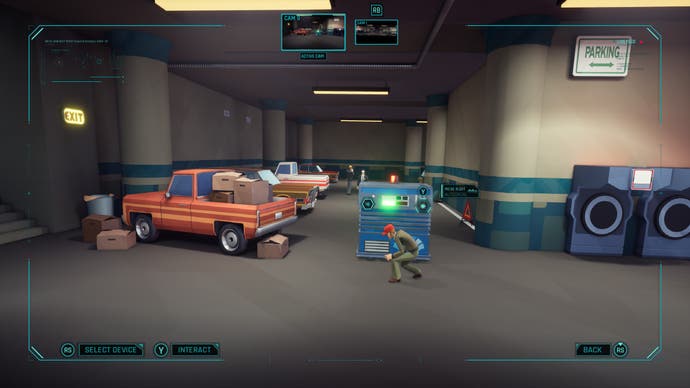
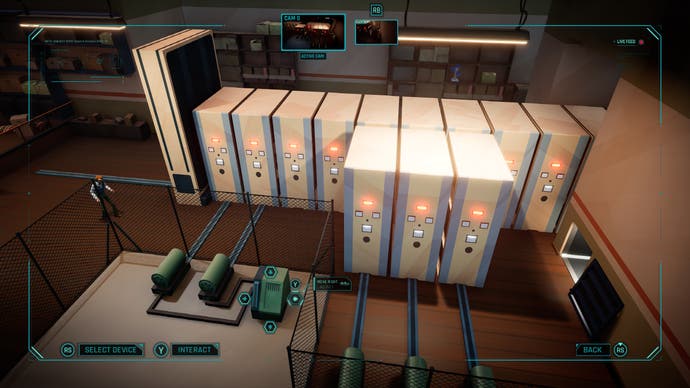
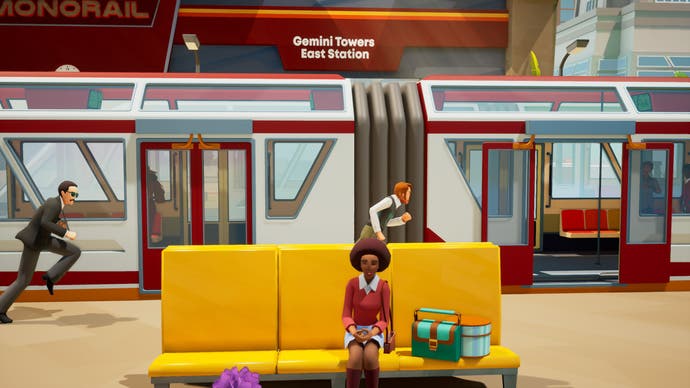
This, broadly, is how the game goes. You're Trevor running and jumping around, then you're the hacker walking around and solving a puzzle, and one flows into the other. It's quite smart the way it happens. And there are some lovely overlapping moments when the hacker is being interrogated while watching a camera feed of Trevor at the same time - which in gameplay terms means you have to answer questions from the interrogator while moving Trevor around. It's playful and inventive, like a lot of the game.
However, there are problems in these sections too. Both sides of the game feel slightly underdeveloped to me. I don't mean underdeveloped in a broken or unfinished state, because the game is not that at all, but underdeveloped in the sense the individual core gameplay mechanics lack detail and an inherent sense of joy that comes through using them.
Let's take Trevor's platforming as an example. He runs left and right and jumps and climbs, and can pull some objects around. But that's it - it's very basic. And too often these sections feel like you're simply holding a stick in one direction and intermittently jumping. They're boring. There's no delight in discovery as you find new things the platforming sections can do.
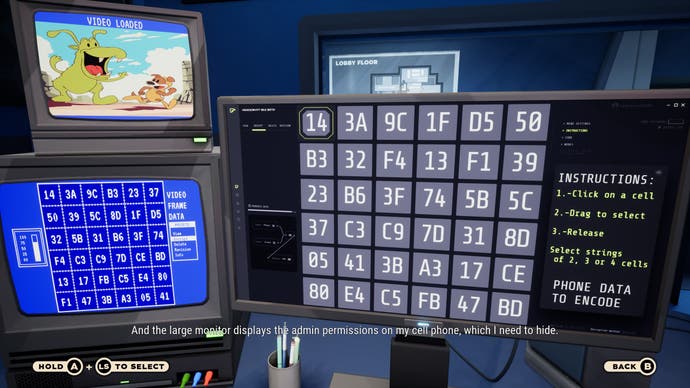
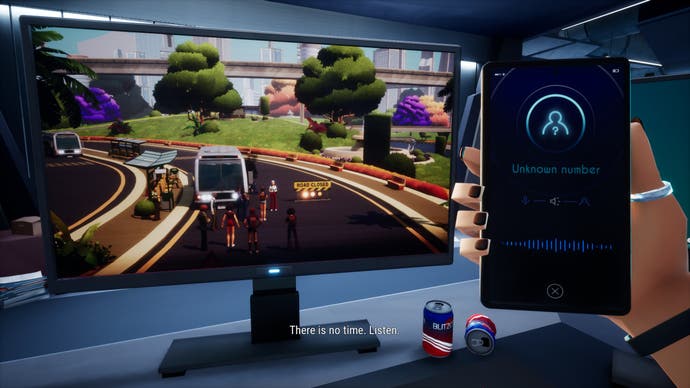
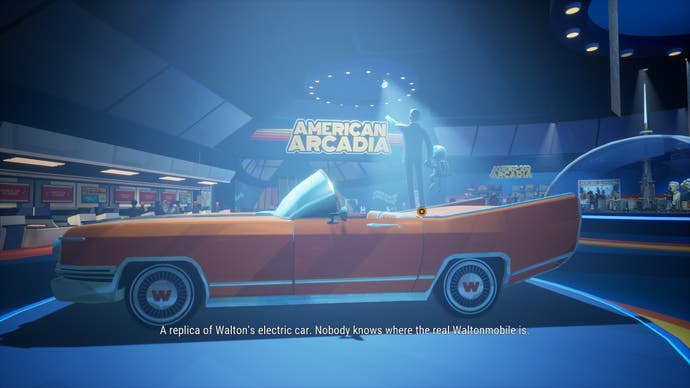
The CCTV hacking mechanics are supposed to be the difference, but they don't add much. You can switch some things on or off and move things around, and that's it. I want - and wait - for this to build to a meaningful puzzle, but it never does. Worse, it can be aggravating to use. The game encourages you to play with a controller, so I do, but with a controller, the CCTV interactions seem really imprecise. It's hard to get the thumbstick to recognise exactly which interaction you want to use, which is a real problem when you're trying to do it quickly in a time-pressured situation.
It doesn't help that the game favours a kind of trial-and-error approach to these sections too, as though it wants you to die a few times before you figure out what you're supposed to do. I don't mind that normally but when I'm dying because I'm struggling to use the controls, I do. These bursts of frustration stand out all the more because in general, the game is all breezy progress. You're much taken along for a ride so when you hit bumps like these, it's really jarring, and it threatens the enjoyment of the whole game.
The puzzles are better when you're the hacker because there's no time-pressure, usually, but still, there's a lack of detail here. Maybe it's because the game keeps throwing different puzzles at you, that none are given enough time to develop in their own right. It means you end up glancing through a dozen different things rather than diving down deeper into any single one, and it doesn't feel particularly satisfying because of it. And there's frustration here too from the trial-and-error approach, especially when it takes time to redo sections.
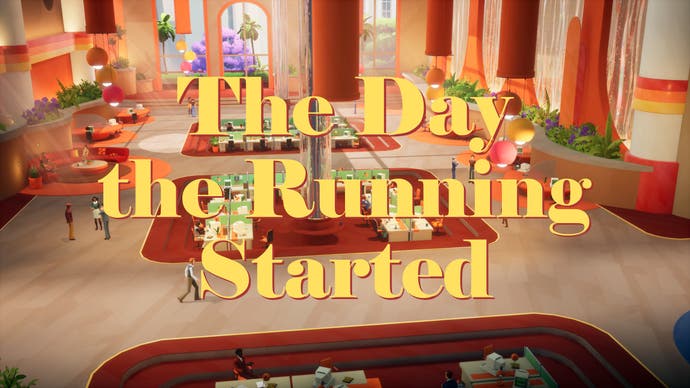
Altogether, it leads to a feeling that the story part of American Arcadia was the most important thing, and what you do in the game came second. Sometimes it feels like there's a puzzle there simply because time has passed and the developer thought there ought to be a puzzle there, if that makes sense? They stick out a bit for it. Coupled with an inability to affect the outcome of the story much, this theory gains strength.
Yet I still find myself smiling at the memory of American Arcadia, and I felt compelled to gobble through the six or so hours it lasted, even with the occasional frustrations. I like the way it spun the Truman Show idea with a modern twist, and even though I had an idea where it was going, it still managed to land surprises along the way. Presentationally, too, it's a winning package. Out of the Blue has an eye for design, clearly, because although the game doesn't use densely detailed environments, they still manage to come off as photogenic, and radiate vibrancy and warmth. It's some hanging vines here, clever layouts there, glaring orange stripes there, curvy plastic edges there. It's surprisingly effective.
And it's in the way the game is put together - the directorial sense of control felt throughout. The game speeds you through a series of playable but brief vignettes at the beginning, to backfill the days before you break out, and it provides a humorous snapshot at the characters and world without so much as a pause in the action. It pacey and it feels really slick. I think it shows real confidence and craft. Layer on oversized 70s disco lettering to tease the chapter ahead, and the exemplary performances from the whole cast - Cissy Jones is back from Call of the Sea and she's brilliant again - and it makes for something that's a pleasure to be around.
So yes, American Arcadia doesn't ask you to do very much, and there are some problems and frustrations with what you do do, but overall, as a breezy adventure to be swept along by one weekend, it's difficult to resist.










